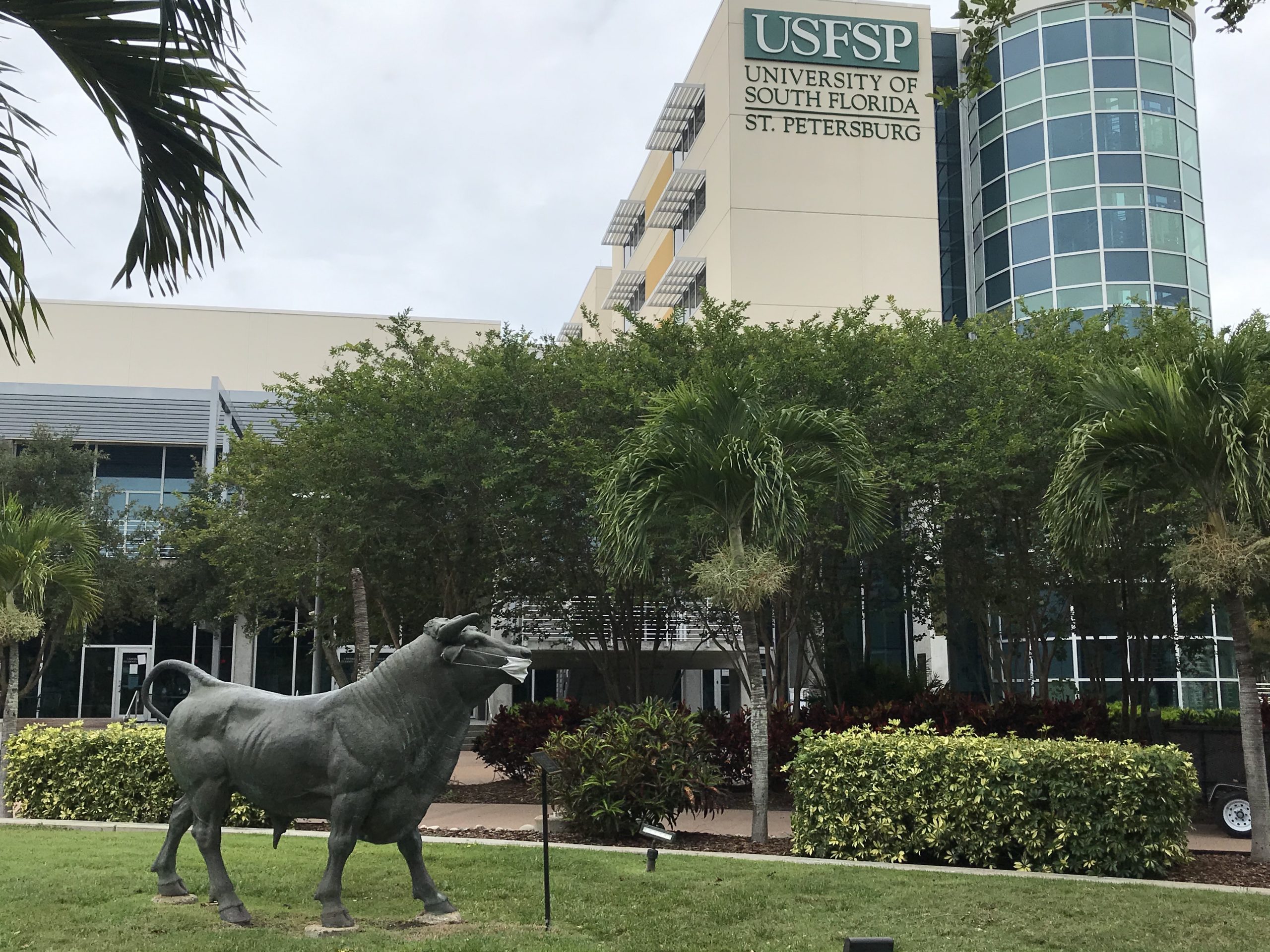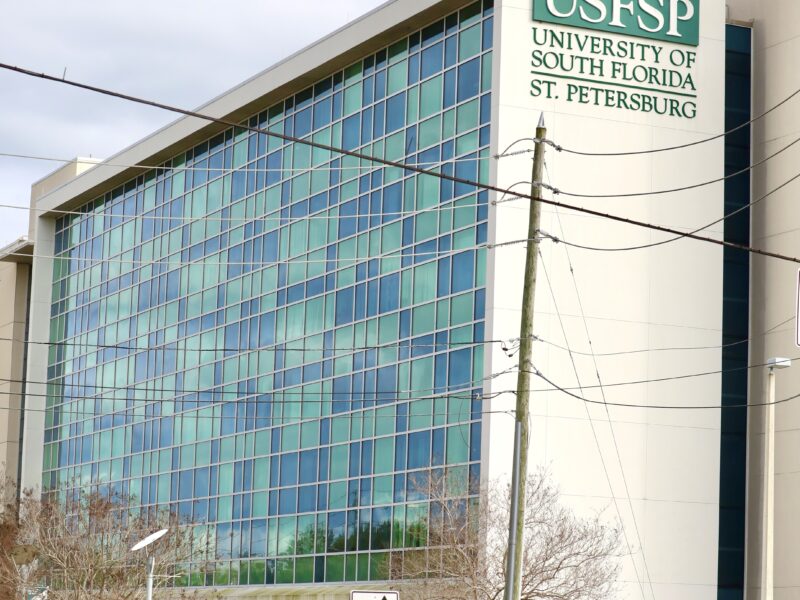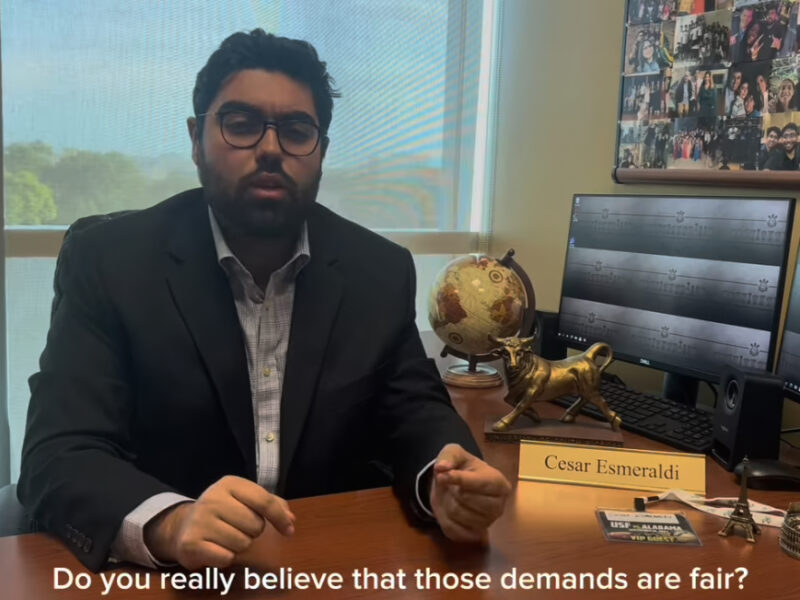Pictured Above: Students have taken to social media following denials for federal financial aid under the CARES Act.
Cassidy Schuck | The Crow’s Nest
By Catherine Hicks
Of the nearly 38,000 USF students eligible, over 7,000 students facing financial hardship due to the COVID-19 pandemic have received emergency assistance under the federal CARES Act.
But some students who sought the federal aid had their applications denied – and they’re not happy about it.
Dozens of students have taken to social media to grouse about the process and wonder how they will make ends meet.
“I [thought] I would automatically qualify,” wrote Wendy Castro on a Facebook post in the ‘USFSP The Know it All’s Guide to Knowing it All!’ Group, “I applied before and I have really low family contribution on my FAFSA… I’m not saying anything’s going on, it’s just frustrating.”
Threads littered the USF Reddit and Facebook groups, with some students reporting that they’d automatically received $1000 in funding, while others said they received nothing.
“I do not believe [the] financial aid [office] has done right by USF students, specifically those who have recently graduated,” said Emily Hickmon, who graduated with a bachelor’s in criminology in May.
“I can’t work because of the virus, so I have no money saved up for the fall,” said Cassidy Delbango, a sophomore marine biology major. “My dad is about to retire so we’ll be losing a salary [from him], and my mom can’t work because of physical limitations, so we don’t have a salary from her.”
Under the Coronavirus Aid, Relief and Economic Security (CARES) Act, USF received $35 million, $17.4 million of which is for student aid – the fourth highest federal allocation in the state of Florida.
But the allocation came with strict rules that the university must follow, said Erin Dunn, director of financial aid and scholarships on the St. Petersburg campus.
“Some situations are truly heartbreaking, and at times I’ve had to deny an application because of the stringent rules inherent in the equitable distribution of federal aid,” she said.
The CARES money is not the only resource for students who are facing financial hardship due to the pandemic.
Last month, the university announced that it will give $20 million to nearly 22,000 students under the “We Got U-SF” scholarship and waiver program.
That program, which is not available to students getting CARES funds, is designed to encourage full-time enrollment in the fall semester by providing support to students who might not otherwise be able to pursue a full-time education.
The coronavirus pandemic has hit America’s college campuses and their students with a staggering blow, forcing an end – at least temporarily – to in-person classes and plunging both the institutions and students into financial uncertainty.
Congress responded to the pandemic by enacting the CARES Act, a historic $2.2 trillion dollar stimulus package, which included $14 billion in funding for institutions of higher learning, such as USF, and individual stimulus payments of $1,200.
Millions of college students across the country were excluded from receiving a stimulus check under a provision that barred dependents over the age of 17. CARES Act funding provided to universities was intended to address this need.
When USF first received the $17.4 million on April 27, almost 6,000 students were notified that they were eligible for an automatic award of $1,000.
Students who did not receive an automatic award were invited to complete an application. Thousands flooded in.
“As of June 25, we’ve received over 5,500 applications in total,” said Dunn, “For USFSP specifically, we’ve received almost 400 applications.”
In order to receive funding, students must be eligible for Title IV funding, maintain satisfactory academic progress, be enrolled at least part-time, must not be in a fully online program and have available unmet financial need.
Students who didn’t receive an automatic award and put in an application shared a handful of difficulties they encountered, including never receiving a decision, a reason for denial, or not having enough unmet financial need.
Hickmon was originally notified via email that she was eligible for $1,000 in CARES Act funding. The funds were added to her OASIS account, but she later noticed the funds had been removed.
She was then forced to apply for CARES funding and provide documentation.
“I showed proof of medical debt, prescription costs, bills, being unable to work due to COVID-19 and medical information including proof of doctor’s visits where I had been showing symptoms of COVID-19,” Hickmon said.
“Even with the abundance of proof I supplied, a couple weeks later, I was denied for CARES Act Funds and the only reasoning they gave me was that I already received funds from the CARES Act.”
Students graduating in the spring were given until May 7 to complete an application for CARES funding – roughly 10 days – excluding some of the most sorely affected by the financial instability COVID caused from receiving help.
“Before graduation, I had multiple jobs lined up that have since pulled out their offers or ‘postponed’ the hiring process indefinitely due to the virus,” Hickmon explained, “I have applied to over 20 different jobs since graduating in May, [but] I have been unable to find a job.”
According to Dunn, students were denied funding through the CARES Act due to strict federal guidelines and a lack of space in their available unmet need, which is determined by the gap between a student’s cost of attendance and financial aid already awarded.
Some students were reluctant to place blame on the office of financial aid, and rather questioned the overall decisions of USF administrators amid the pandemic.
“It’s hard for me to say if they’ve been distributing the money fairly because no one I know has actually gotten it,” Delbango said. “I’m sure the students who are receiving it are grateful, but I don’t think it’s enough for them to feel comfortable going into the next semester, especially knowing that our dorms won’t be refunded if we end up getting kicked off campus.”
USF St. Petersburg recently shared an addendum to the housing contract that said students will not be refunded housing expenses if the university is forced to close residence halls again due to COVID-19.
Dunn said that along with pre-existing aid covering cost of attendance, some of the most common reasons for denial are circumstances not a consequence of COVID-19 or the submission of expenses unrelated to COVID-19.
Many students in unstable financial situations display financial need year-round and are awarded financial aid that covers the entire university-estimated cost of attendance. These students are not eligible to receive CARES Act funding.
However, students who are eligible for CARES funding and have available unmet needs are allowed one CARES Act award per semester for up to three semesters.
“I would like to be able to have flexible funding to address the needs of students that can’t receive funding from other sources,” Dunn said. “The more flexibility we have with student criteria, the more we can help address the varying needs of students that we know and we understand.”
The We Got U-SF scholarship begins to answer her wishes.
Eligibility requirements for the We Got U-SF scholarship are broader than the CARES Act, including requirements of full-time enrollment in the fall semester and not currently receiving scholarships for fall through the Office of Admissions, CARES Act, or other third-party tuition payments.
Like the CARES Act, the We Got U-SF scholarship does not include students who were already awarded aid covering their cost of attendance.
“We hope this investment will help support their full-time enrollment this fall as students begin their academic journey or continue to pursue their educational goals at USF,” said the USF Provost and Executive Vice President, Ralph Wilcox, in the June 16 announcement.



